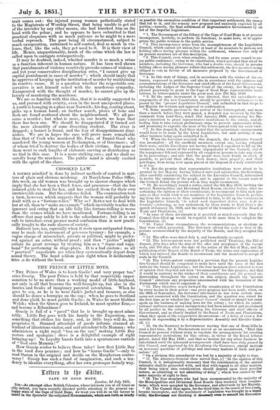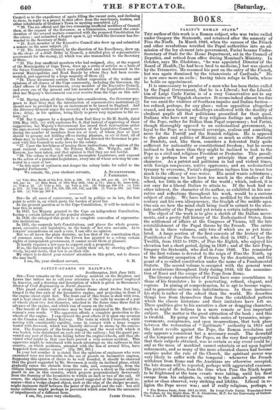Itttno to tyr ehttnr.
CAPE OF GOOD HOPE.
London, 3d July 1851,
Snt—As amongst other British Colonies, whose interests you at all times so ably defend, you have recently directed public attention to the present un- ?lappy Mate of the Cape of Good Hope, we trust you will do us the favour to insert in the Spectator the subjoined Memosandann, which sets forth as briefly as possible the anomalous condition of that important settlement, the causes that led to it, and the remedy now proposedand anxiously expected by all parties,—namely, the final settlement of Representative Government by an act of the Imperial Legislature.
" 1. The Government of the Colony of the Cape of Good Hope is at present incompetent, lawfully, to perform its functions, to make laws, or to appro- priate the public revenue to the public service. " 2. This incompetency arises from the incompleteness of the Legialative Council, which cannot act unless four at least of its members be persons not holding offices during pleasure within the settlement, whereas two only of its present members are of this description. "3. This Council, even when complete, had for some years ceased to en- joy public confidence ; owing to its constitution, which provided that sixof its members, including the Governor, who had a double vote, should be persons holding offices during pleasure within this settlement, the five members being obliged to vote in favour of all measures proposed by the Government or Governor.
" 4. In this state of things, and in accordance with the wishes of the co- lonists, expressed in petitions, and also in accordance with the opinions and .recommendations of the Governor and chief officers of the Local Government, including the Judges of the Supreme Court of the colony, her Majesty was pleased graciously to grant to the Cape of Good Hope representative insti- tutions, by letters-patent under the great seal, date 23d May 1850. " 5. By the same instrument it was directed, that the subordinate ar- rangements of the new Constitution should be provided by ordinances to be passed by the 'present Legislative Council,' and submitted in that shape to her Majesty for revision and approval or confirmation.
"6. Some months previous to the arrival of the letters-patent, and more than a month before they were passed, a despatch was received by the Go- vernment from Lord Grey, dated 31st January 1850, announcing her Ma- jesty's intention to grant representative institutions to the colony, and di- recting him to take certain preliminary steps to prevent unnecessary delay, and promising to expedite the issue of the letters-patent with the seine view.
" 7. In this despatch, Earl Grey stated that the subordinate arrangements would have to be made by the Local Legislature, but said nothing of any other business being again submitted to it.
" 8. When the Governor received this despatch, the Legislative Council was incomplete : all the unofficial members, except one, havit's resigned their seats, and his Excellency not having deemed it expedient to fill up the vacancies, being aware of the extreme unpopularity of the Council, and of the repugnance felt and expressed by all competent persons to take any share in its proceedings ; and also that the people were most firmly re-olved, if possible, to prevent their affairs, their money, their proper. y, and their privileges, from being ever again placed at the disposal of a body constituted as it was.
" 9. But the promise that representative institutions were about to be
granted by her Majesty. having diffused universal satisfaction, the ms Governor, after carefully considering the subject in the Executive Council, determined to invite the opinions of the people, and to appoint to the vacant seats at the Council Board the persons whom they might recommend.
10. He.accordingly issued a notice, dated the 6th May 1850, inviting the several Municipalities and Divisional Road Boards, elective bodies, after as- certaining the opinion of their constituents, to recommend to him such per- sons as they would wish to see members of the Legislative Council, promis- ing from the names to be thus submitted to him, to till up the vacancies in the Legislative Council, to which such important duttes were to be in- trusted,'—referring, as was understood, by these words to Earl Grey's de- spatch of January 31, 1850, and the report of the Committee of the Board of Trade and Plantations. (a) " In none of these documents is it provided or stated expressly that the Council thus filled up would be required to do more than to complete the Constitution. (b) " 11. Under these circumstances, the recommendations, or elections as they were called, proceeded. The Governor offered the seats to four of the persons recommended by the majority of the Boards, and they accepted the offer.
" 12. The offers were dated July 4, and immediately accepted. " 13. The letters-patent were not published until Thursday, the 23d of August, fifty days after the date of the offer and acceptance of the vacant seats, and 109 days after the data of the notice of the 6th of May, and the publication of the Report of the Board of Trade, the terms and expressions of which had induced the Boards to recommend and the members to accept of seats in the Council.
" 14. The letters-patent contained a provision that the present Legisla- tive Council should be competent to make laws until the issue of the first writs for the future Legislature ; but the four members above referred to were of opinion that they had not been 'recommended' for this purpose, and that it would be contrary to the wishes of their constituents and the general un- derstanding throughout the colony on this subject, should the 'present Council' entertain any proposition unconnected with the formation of the Parliament which was to supersede it.
" 15. They therefore urged forward the consideration of the Constitution by every means in their power : and great progress had been made, when, on the 20th of September, the Governor introduced in due form certain mea- sures not connected with the Constitution, and the question was raised for the first time as to whether the 'present Council' should or should not enter again on the business of making laws for the colony ; for which its consti- tutional unfitness and moral incompetency had been admitted and proclaimed by all parties in the colony, including the Governor and chief officers of Government, and as clearly implied by the Board of Trade and Plantations, when they speak of the comparative inconvenience of a delay of even a few months in superseding it by a Representative Assembly and Elective Coun- ciL (e)
16. On the Secretary to Government moving that one of those bills be read a first time, Sir A. Stockenstrom moved as an amendment, That this Council do proceed without delay to regulate the arrangements for creating representative institutions for this colony, in virtue of the Royal letters- patent, dated 23d May 1850; and that no motion for any other business be entertained until the aforesaid arrangements shall have been duly passed by this Council, and approved by his Excellency the Governor, except motions on necessary questions of privilege and necessary matters of form and pro- cedure.' (d) " On a division this amendment was lost by a majority of eight to four.
" 17. The Attorney-General then moved that, (e) 'In the opinion of this Council, it is indispensably necessary that the consideration of the annual estimates shall be proceeded with, and that with regard to all other matters, their being taken into consideration should depend upon their peculiar nature, as admitting or not admitting of delay' ; which was carried by the same majority of eight to four.
" 18. The four Members who had been recommended by the majority of the Municipalities and Divisional Road Boards then tendered their resigna- tions; which were accepted by the Governor, and afterwards by her Majesty. " 19. The Council thus again, for the third time in the course of two y became incomplete, and the machinery of legislation was brought to a stand still tilieGavermir not thinking it neoemary even to consult his Exectitive Council as to the expediency of again filling the vacant seats, and declining to do so, in reply to a prayer to that effect from the merchants, traders, and other inhabitants of Graham's Town in meeting assembled. (f) " 20. The six official and the two remaining unofficial members of Council then, at the request of the Governor, as a Commission, resumed the consi- deration of the several matters connected with the proposed Constitution for the colony ; and submitted aReport upon it, (g) which the Governor has for- warded to the Secretary of State. " 21. Each member of the Executive Council also drew up and submitted a minute on the same subject. (h) " 22. The Attorney-General, by the direction of his Excellency, drew up, in the shape of a draft Order in Council, a detailed plan of representative government for the colony, (0 which was also transmitted to the Secretary of State.
" 23. The four unofficial members who had resigned, also, at the request of the Municipality of Cape Town, drew up a series of articles as a basis of the future Constitution ; which were published and much discussed in the several Municipalities and Road Boards by whom they had been recom- mended, and approved by a large majority of them. (09
"24. These documents contain the fullest expression of the wishes and op-miens of all classes of the Cape community, including the Governor, the chief officers of the Government, every member of the Executive Council, and every one of the present and late members of the Legislative Council, that her Majesty's Government can ever receive from the Cape on this sub- ject. "26. Having taken all these things into consideration, the Governor pro- poses to Earl Grey that the introduction of representative institutions (1) should now be provided for by an instrument to be issued in England. And the Attorney-General urges the necessity of a speedy settlement of the ques- tion ; delay, in his opinion, being likely to prove very injurious to the co- lony. (n) "26. But it appears by a despatch from Earl Grey to Sir H. Smith, dated 13th May 1851, (n) with enclosure No. 9, that instead of approving of these suggestions, her Majesty's Government has issued fresh instructions under the sign-manual respecting the constitution of the Legislative Council, re- ducing the number of members from ten at least, of whom four at least should be persons not holding offices during pleasure, to six at least, all of whom may be holders of such offices; and has directed the Governor to pro- ceed with this Council to make laws for the colony.
"27. Upon the lawfulness of issuing these instructions, the opinion of the most eminent counsel, viz. Sir Fitzroy Kelly, Mr. Walpole, and Mr. Kenyon, has been taken, and that opinion is that they are not lawful. "28. The colony is thus left with an incomplete Legislature, and exposed to the action of a pretended Legislature, every one of whose acts may be con- tested in a court of law.
"In this state of confusion and danger the colony looks for relief to the Imperial Parliament."
We remain, Sir, your obedient servants, A. STOCKENSTROM. J. FAGG:m.1EN.
(a) Vide Blue Book of 5th Feb. 1850, p. 100. (b) Id. p. 108, par. 42.. (e) Vide p. 108, par. 44. (d) Blue Book of 19th May 18.51, vide p. 71 - also p. 11, more fully. (e) Vide 12. (f) Vide p. 188. (g) Vide p.151. (A) Vide pp. 168-171. Ii) Vide p. 171. (1) Vide pp. 117, 118, 119, 129, 138, 142, and 189. (1) Vide p. 191. (m) Vide p. 168. n) Vide pp. 203-4.



























 Previous page
Previous page